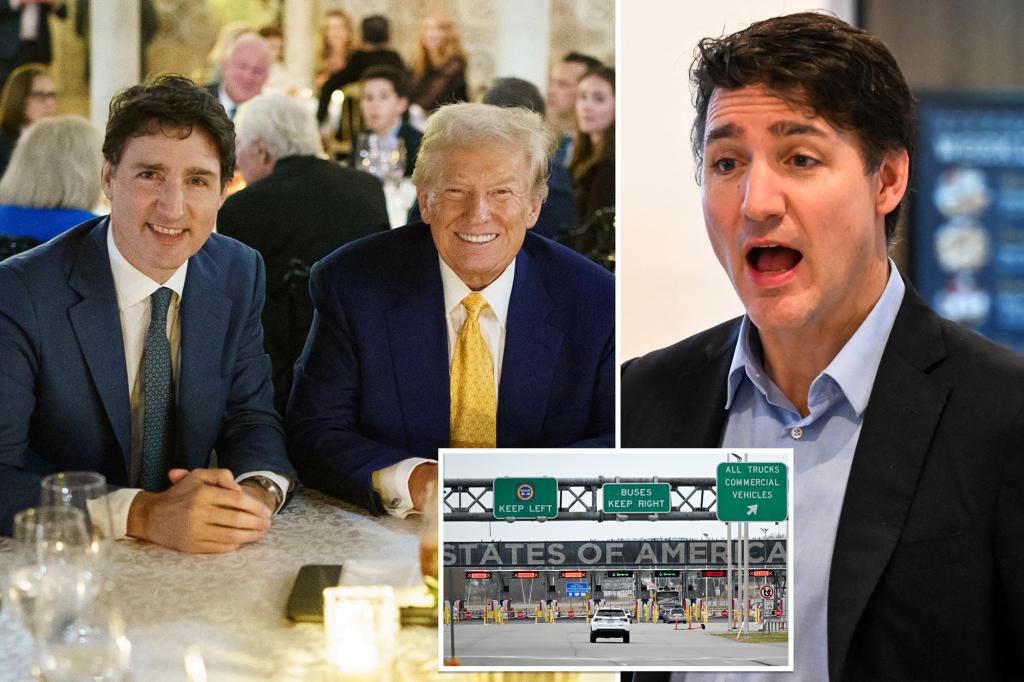During a recent dinner at Mar-a-Lago, President-elect Donald Trump made a light-hearted comment to Canadian Prime Minister Justin Trudeau about Canada potentially becoming a part of the United States if it struggles to cope with Trump’s proposed tariffs. This remark came in the context of Trump’s ongoing threat to impose a hefty 25% tariff on Canadian imports, a move that has been a significant point of tension between the two leaders. The meeting lasted three hours and was primarily focused on addressing Trump’s aggressive trade policies that many in Canada fear could severely damage their economy.
Trudeau, who has expressed concern over the potential tariffs, emphasized to Trump the devastating impact such a move could have, stating that it would essentially “kill” Canada’s economy. Trump responded with a provocative comment about how Canada’s economy might not be sustainable without “ripping off” the U.S. to the tune of about $100 billion, referencing the existing trade deficit. This statement highlights the contentious nature of U.S.-Canada trade relations, wherein Trump has often accused Canada of exploiting trade agreements to its advantage, causing a significant imbalance in economic transactions.
The dinner conversation included various light-hearted jabs, including Trump jokingly suggesting that if Canada did not align with U.S. interests, it might as well become the 51st state, with Trudeau as its “governor.” When the topic shifted to the political landscape, Trump humorously proposed dividing Canada into two states—one liberal and one conservative—acknowledging the country’s political diversity. These remarks elicited nervous laughter from Trudeau and other attendees, revealing the underlying tension and seriousness of the issues being discussed amid attempts to inject levity into the situation.
In addition to the tariff discussions, Trump used the meeting to reiterate his demands concerning immigration and drug smuggling, emphasizing the need for Canada to take action by January 20, the date of his presidential inauguration. This shows Trump’s broader agenda of using trade policies to compel neighboring countries to align with U.S. domestic priorities, particularly regarding border security and immigration controls. His approach reflects a transactional view of international relationships, where economic agreements are leveraged to achieve political goals.
Following the dinner, Trump characterized the conversation as “very productive” on his social media platform, suggesting that despite the contentious topics, there were constructive elements to their discussions. This comment indicates an attempt to project confidence and a sense of collaboration, even in the face of significant disagreements regarding trade policies and political ideologies. The juxtaposition of humor and serious policy discussions points to Trump’s unique style of diplomacy, which often involves combining personal rapport with firm negotiating tactics.
As the world watches the implications of these conversations unfold, the outcomes of such high-stakes discussions between Trump and Trudeau will be crucial in determining the future of U.S.-Canada relations. The potential for tariff implementation looms large, and both leaders will need to navigate a complex landscape where economic health and political priorities intersect. While Trump’s quips may provide a temporary reprieve in the atmosphere, the substantive challenges ahead necessitate focused negotiations that balance trade interests with broader diplomatic relationships. The evolving dynamics will be critical not only for Canada’s economy but also for U.S. trade policy under a new administration.

